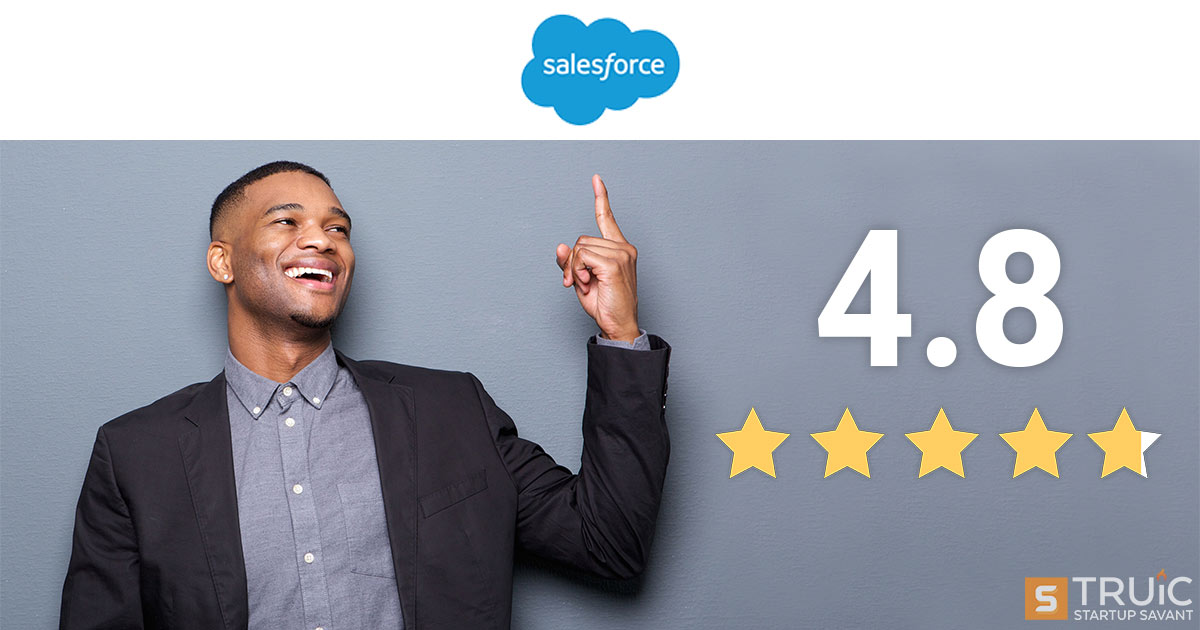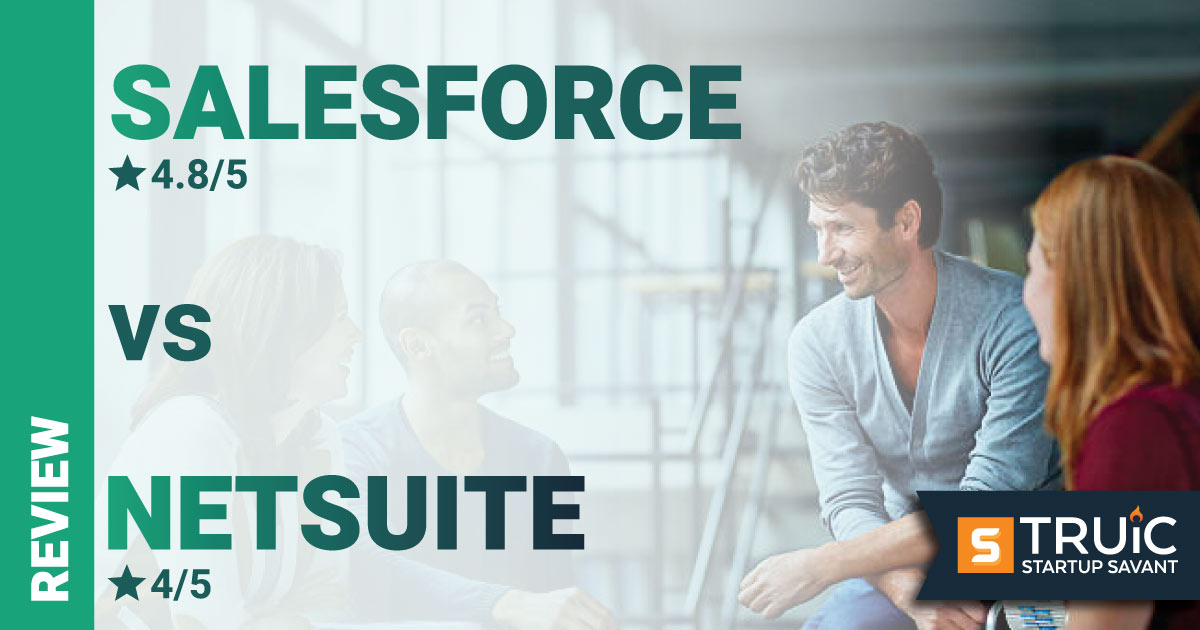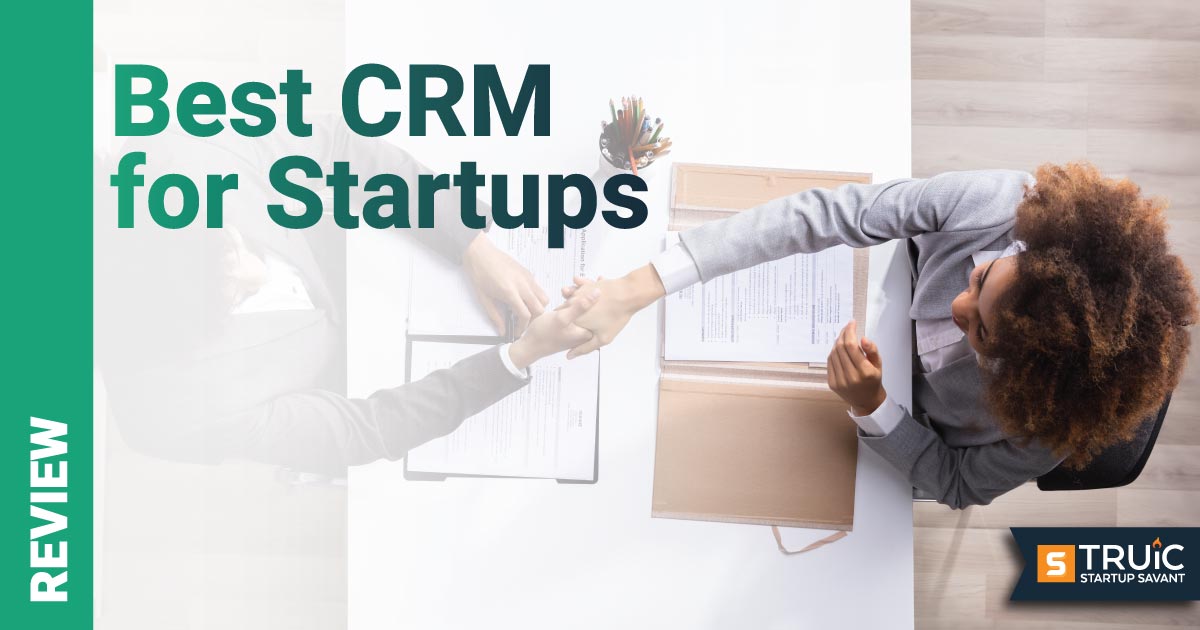Salesforce CRM Review 2024
Is It the Best CRM Software for Startups?

Last Updated: By TRUiC Team
Improving relationships with customers and potential customers can increase your business — that’s why so many startups and established businesses are turning to CRM (customer relationship management) software. But figuring out the best CRM for startups in 2024 can be confusing.
Salesforce offers a plethora of features and advanced sales analytics in a user-friendly, cloud-based plan. Check out our Salesforce CRM review below for a simple breakdown of one of the best CRM software packages, including customer reviews and alternative options.
Recommended: Get started with Salesforce today.
Pros and Cons of Salesforce CRM
Salesforce CRM software helps businesses store customer information and track activity while maximizing sales and marketing opportunities. Its intuitive, easy-to-use interface and comprehensive offerings make it a top player in the CRM field, and it’s no surprise there are over 150,000 Salesforce customers worldwide.
Pros of Salesforce CRM Software
- User-friendly design
- Highly customizable
- Comprehensive selection of tools and features
- Strong integration capabilities
- Can scale with your business
Cons of Salesforce CRM Software
- Add-ons can drive up costs
- Customizing can be complex
Should You Use Salesforce CRM?
We recommend Salesforce CRM software because it's user-friendly and offers a plethora of essential features.
Salesforce CRM Pricing and Features
Salesforce offers four distinct plans for its Sales Cloud CRM software. These plans vary in terms of features and pricing. Consider the needs of your business to determine which CRM software plan works best for you.
Essentials ($25/User/Month)
Notable Features:
- User-friendly
- Capture and track customer activity
- Manage customer support in one place
- Access detailed metrics and analytics
- App available so you can work on-the-go
Professional ($75/User/Month)
Notable Features:
- Comprehensive forecasting
- Customizable reports
- Lead management
- Marketing campaigns
- Sales data
Enterprise ($150/User/Month)
Notable Features:
- Advanced customization tools
- Business process automation
- Pipeline management
- Real-time team updates and forecasts
- Lead tracking and scoring
Unlimited ($300/User/Month)
Notable Features:
- Centralized Selling Hub
- Premium activity capture
- Built-in sales cycle intelligence
- AI functionality
- Expert guidance and tailored resources
Salesforce for Startups
Salesforce is a highly recommended CRM software solution for startups. This is due to its ability to easily scale alongside a rapidly growing business and the support it offers growing businesses.
The Salesforce AppExchange and Accelerate program provides startups with tools, guidance, and support aimed at helping grow their business. Salesforce CRM software also provides startups with critical and continuous data that entrepreneurs can use to make key decisions.
Additionally, Salesforce offers its Ventures program, which invests in and partners with some of its startups.
Salesforce CRM Reviews
Salesforce is a highly-rated CRM software solution used by leading brands. Let's see what its customers have to say to get a better idea of whether it is the best CRM software for your business.
Here are some verified reviews from TrustRadius by people who used Salesforce CRM:
“Our entire business uses Salesforce.com to run customer-centric processes, sales, marketing, quoting, customer service, and field service. Because of this, it is actually very advantageous because everyone is using the same data and we can build entire business and customer processes around it. All of our associates have wide and deep visibility, and this is especially useful for customer-facing field teams (sales, service).”
“I would recommend it to a person wanting to get really technical about their pipeline management. If you are interested in specializing all types of different consoles and spending a lot of time and energy to customize the software - this is for you. If you do not want to do that, and you would like a software that is pretty easy to work with right out the gate - I would suggest that you use a different product.”
“We use Salesforce company-wide to help with monitoring our sales strategy, daily tasks, opportunities, and overall pipeline. I use Salesforce daily to monitor my tasks to call prospects and clients. This has been very helpful in keeping me organized. This is used by our sales teams throughout the organization to help monitor our activity and make sure that every next step has been addressed. This also helps with ensuring our pipelines are up to date.”
The ideal Salesforce CRM customer is likely a startup looking to leverage CRM for rapid growth or an established business ready to focus more deeply on CRM. In both cases, Salesforce provides an impressive variety of support and management tools.
Satisfied customers find Salesforce to be a comprehensive, user-friendly tool that can manage complex processes in one place. In addition, growing businesses appreciate that Salesforce can easily integrate with a host of marketing and other apps and tools.
Smaller businesses that aren’t ready to scale sometimes note that the customization capabilities and price are more than they need. If you are a very small business without staff to devote to working with the software, this may be an issue. At the same time, because Salesforce wants to grow with you, it offers several business support tools.
How Does Salesforce CRM Compare?
There are plenty of competitors out there that offer CRM software for startups. One of the more popular is HubSpot. We find that Salesforce compares to HubSpot in the following ways:
Pricing
HubSpot offers free basic software that includes CRM, live chat, contact management, quotes, and meeting scheduling. While Salesforce offers a free 14-day trial plan, its basic software starts at $25/month. Beyond its free plan, HubSpot offers three tiered plans starting at $45/month for the Starter plan to $450/month (Professional) and $1200/month (Enterprise).
Salesforce’s plans range from $25 to $300 per month, offering loads of add-ons through its apps and integration. While HubSpot starts off offering a free plan, its paid plans become quite pricey yet allow for more users. Salesforce’s plans are priced lower overall, but the many add-ons can definitely increase the price.
Features
Both HubSpot and Salesforce offer great tools and features, but it helps to keep in mind that Salesforce is best known for sales automation software, while HubSpot is primarily known as an inbound marketing tool. So, while they each offer many comparable tools, HubSpot tends to be slightly stronger on the marketing side and Salesforce on the sales side.
For example, you will need a paid plan to reach HubSpot’s advanced sales features, whereas Salesforce’s features come included with its less expensive Essentials plan. Meanwhile, HubSpot offers extensive marketing features with its free plan, while Salesforce requires you to purchase marketing features as add-ons for a monthly fee.
Ease of Use
Both HubSpot and Salesforce offer complex CRM software in an intuitive, user-friendly design. However, when considering only ease of use, HubSpot, with its more simple interface and design, comes out on top.
But while HubSpot takes the top spot for ease of use, that ease comes at a price. HubSpot lacks some of the complexity of Salesforce, especially in its free and lowest-tiered plan. So, though some of Salesforce’s advanced customizations will require patience, the software offers unmatched sophistication.
Integrations
Integrations can help you get the most out of your CRM software by allowing you to optimize marketing, sales, service, and more. Both Salesforce and HubSpot offer impressive integration capabilities, but at the end of the day, Salesforce has a deeper and wider pool of integrations available to its users.
Through its App Marketplace, HubSpot offers over 1,000 integrations, with many apps designed specifically for HubSpot users. With Salesforce’s AppExchange, users will have access to over 2,500 integrations and apps, including integrations for popular SAAS like Slack.
Customization
Salesforce is well-known for its customization capabilities. Through custom software development and coding, users can add powerful features that can scale with their business. Customization is available with all Salesforce plans.
HubSpot CRM software allows for some workflow and process automation customization, but you don’t have the extensive options available with Salesforce. For example, you can not make any coding changes.
Reporting and Analytics
Salesforce is known for its advanced reporting and analytical tools, and when paired against HubSpot, it comes out on top. To have access to HubSpot’s advanced sales and forecasting features, you will need to have a paid plan. With this, you will have access to HubSpot’s strong and quite user-friendly reporting tools.
On the other hand, Salesforce includes more advanced tools with its lower-priced Essentials plan. Salesforce CRM software also allows you to see your entire pipeline on one screen alongside projected revenue figures.
Customer Support
HubSpot and Salesforce offer comparable customer support services and features. Both allow agents to share workspaces to avoid any duplication of responses. Service tickets are issued and tracked using automated systems.
HubSpot offers an easy-to-understand dashboard, whereas Salesforce includes an incident management feature for major problems. The bottom line? HubSpot’s customer support dashboard is more user-intuitive, and Salesforce offers more complex capabilities that may or may not be needed.
Salesforce
Pricing starts at: $25/user/month
In Business Since: 1999
Perfect For: Startups, small to large established businesses
HubSpot
Pricing starts at: $0
In Business Since: 2006
Perfect For: Startups and small businesses seeking a free option
Final Thoughts on Salesforce CRM
Salesforce CRM software boasts complex capabilities in a surprisingly user-friendly design. Its add-on options and support tools make it appealing to startups, while its ability to manage complex processes easily makes it a good choice for both small, established businesses and larger companies.
If you are a small, low-growth business without the staff to support software customization, you may feel that Salesforce is more than you need and opt for a less costly, more straightforward option like HubSpot. However, for all other businesses, we highly recommend Salesforce CRM as one of the best CRM software options available today.
Frequently Asked Questions
What is Salesforce CRM?
Salesforce CRM is a cloud-based customer relationship management (CRM) technology used to manage relationships and interactions with customers and potential customers.
How much does Salesforce CRM cost?
Salesforce CRM offers its Sales Cloud software in four monthly subscription plans ranging from $25/month to $300/month.
What CRM is better than Salesforce?
Because the needs and structures of businesses vary, there is no single CRM that, in all instances, is better than Salesforce. However, if you are a small, low-growth business, you may want to consider a lower-cost basic option with light capabilities, like HubSpot.


